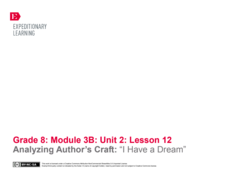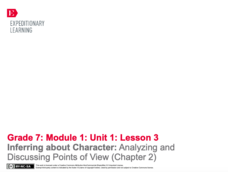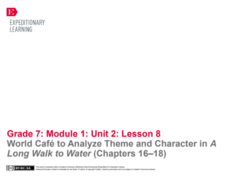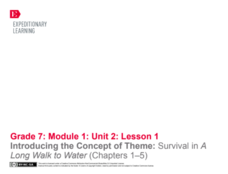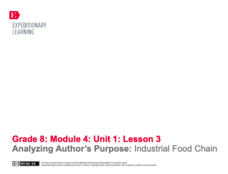EngageNY
Analyzing How Shakespeare’s Play Draws upon Greek Mythology: Part 2
Pupils explore the narrative structure of a piece of literary text, mapping out the plot structure of the Greek myth "Pyramus and Thisbe." Next, they use their completed graphic organizers to write story summaries.
EngageNY
Analyzing How Shakespeare’s Play Draws upon Greek Mythology: Part 3
How do the narrative and play versions of the myth "Pyramus and Thisbe" affect meaning? Scholars reread Act 5, Scene 1 from Shakespeare's A Midsummer Night's Dream and compare its structure to "Pyramus and Thisbe." Next, they use a...
EngageNY
Mid-Unit 2 Assessment: Analyzing Narrative Structure and Author’s Craft: Part 1
Using the resource, scholars complete a mid-unit assessment to gauge their learning at the halfway point of the unit. Pupils read the myth "The Harvest That Never Came" and plot its narrative structure.
EngageNY
Analyzing a Thematic Concept: The Invisibility of Captives during WWII (Pages 182-188)
Readers complete a word web-based on the word dignity. They use their Understanding Invisibility note catcher to discuss how dignity relates to the theme of invisibility. After group discussion comparing invisibility and loss of dignity,...
EngageNY
Analyzing Experiences: Carlotta Walls
What was life like in the American South following the Civil War? Scholars watch a video that discusses the aftermath of the Civil War and the events during the Reconstruction Period. Additionally, they continue reading Carlotta Walls...
EngageNY
Analyzing a Thematic Concept: Becoming Visible after Captivity
Have some dignity. Readers describe the word dignity using a word web and then sort Louie's actions into categories of reconnecting or dignity with a Visibility Double Arrow graphic organizer. They then use all of their ideas and...
EngageNY
Analyzing Theme: The Invisibility of Captives during WWII
Can you see me now? Scholars discuss two definitions of invisibility and then connect the definitions to text evidence related to Louie's invisibility in Unbroken. Readers turn their attention to The Life of Miné Okubo and record text...
EngageNY
Analyzing the Power of Different Mediums: A Mighty Long Way
Weigh the pros and cons. Class members continue sharing their thoughts on media and events by watching the video John Chancellor Reports on the Integration at Central High School. They discuss the advantages and disadvantages of gaining...
EngageNY
Analyzing Author’s Craft: “I Have a Dream”
It's time to make some connections! Scholars complete a close reading of the speech I Have a Dream by Martin Luther King, Jr. They use an I Have a Dream Speech Gist Note-catcher, and I Have a Dream text-dependent questions to guide their...
EngageNY
Informational Essay Planning: Analyzing and Selecting Evidence
Class members look again at the end-of-unit essay prompt for A Mighty Long Way. After reviewing the requirements of the essay, they use their Gathering Evidence note-catchers and color-code the evidence that matches the two questions in...
EngageNY
Analyzing an Author’s Craft: Carlotta’s Journey to Justice
What's an appropriate response? Scholars open the text A Mighty Long Way to see how Carlotta responded to racism, discrimination, and abuse. They work in pairs to answer questions regarding her responses. To finish, they use the Dignity...
EngageNY
Analyzing an Author’s Craft: Carlotta’s Journey to Justice
Find your voice. Readers look at a passage from A Mighty Long Way and discuss what it means for Carlotta to find her voice. After discussing figurative language and idioms, learners listen to the song "This Little Light of Mine" and...
EngageNY
Inferring about Character: Analyzing and Discussing Points of View (Chapter 2)
Readers engage in discussion with partners to answer questions about A Long Walk to Water by Linda Sue Park. Next, they complete exit tickets, writing about how the author creates different points of view for her characters.
EngageNY
Practicing Structures for Reading: Gathering and Using Evidence to Analyze Salva’s and Nya’s Points of View (Chapter 4)
Class members discuss the gist of chapter four of A Long Walk to Water by Linda Sue Park with a partner and share their responses with the class. Next, they complete graphic organizers to answer text-dependent questions based on a close...
EngageNY
Mid-Unit Assessment: Gathering and Using Evidence to Analyze Points of View in A Long Walk to Water (Chapter 5)
Class members discuss how culture, place, and time influence a character's identity in A Long Walk to Water by Linda Sue Park. Then, as part of a mid-unit assessment, they complete a Gathering Evidence graphic organizer to answer the...
EngageNY
Inferring about Character: Analyzing and Discussing Points of View (Chapter 2)
Welcome to the World Café! Readers discuss A Long Walk to Water by Linda Sue Park. They circulate throughout the classroom, stopping at different tables to answer a discussion prompt with their classmates and record their ideas on a chart.
EngageNY
World Café to Analyze Theme and Character in A Long Walk to Water (Chapters 16–18)
Here comes a surprise ending! Readers discuss their thoughts about the ending of A Long Walk to Water by answering probing questions. They participate in a World Café where they work in triads to complete a chart and a prompt during...
EngageNY
Analyzing the Central Ideas, Part 1: “The Border”
What is your strategy? Scholars read "The Border" and work with a partner to practice reading strategies to use while independent reading. They identify difficult parts where they practiced rereading by marking them with sticky notes,...
EngageNY
Analyzing the Central Ideas, Part 2: “The Border”
Writers use the Short Response Graphic Organizer: The Border to learn how to answer short response questions. After completing the organizer, they rotate among classmates conducting peer critiques of their work.
EngageNY
Analyzing Text Structure: “Generation Z Stereotyped”
Breaking the stereotype. Readers use the Generation Z Stereotyped Structure anchor chart and find the central idea of the text. They then read Generation Z with partners and discuss the text using guiding questions. Finally,...
EngageNY
Analyzing Author’s Purpose: Industrial Food Chain
Using an Author’s Purpose anchor chart, groups examine a variety of text to determine the author's purpose. They then apply what they have learned to The Omnivore’s Dilemma. In pairs, they discuss what the text is about and why...
EngageNY
Analyzing Character: Who is Lyddie?
Character analysis can help readers feel more connected to a literary text. Scholars explore the topic by writing an acrostic poem about the main character from Katherine Paterson's novel, Lyddie. Then, pupils watch a short video to help...
EngageNY
Analyzing Textual Evidence: Working Conditions in the Mills
Deafening, dusty, debris. Such were the working conditions in the 1800s textile industry as portrayed in Katherine Paterson's novel Lyddie. Scholars watch a short video clip about life and work in the mills. Next, they work...
EngageNY
World Café to Analyze the Characters in Lyddie
Order up! Welcome to the World Café, where scholars engage in small-group discussions based on Katherine Paterson's novel Lyddie. As pupils circulate around the room, they talk with classmates about the novel's characters, setting,...
Other popular searches
- Analyze Portraits
- Analyze Characterization
- Analyze Maps and Charts
- Analyze Setting
- Analyze Writing Technique
- Analyze Character
- Analyze Poetry
- Analyze Letter to Editor
- Analyze Information
- Analyze Facts
- Analyze Author's Use of Text
- Analyze Plot Development








